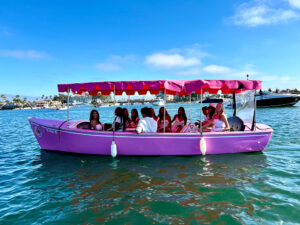Introduction
Welcome to the world of green boating, where the thrill of navigating the waters meets a commitment to environmental sustainability. As boating enthusiasts, we have a unique responsibility to protect the marine environments that offer us so much joy and recreation. Adopting eco-friendly practices not only preserves these natural resources but also enhances the quality of our boating experience, ensuring that future generations can enjoy the same beautiful waters.
The concept of green boating involves more than just using an eco-friendly boat; it extends to every aspect of boating, from the way we power our vessels to how we handle waste on board. This article explores how you can maintain an eco-friendly lifestyle while enjoying your time on the water, covering everything from the type of boat you use to the products you choose for maintenance.
By embracing these practices, boaters can significantly reduce their environmental footprint, contributing to the health of our planet’s waterways. Let’s dive into the practical steps you can take to become a green boater, starting with the choice of your vessel.
Understanding the Impact of Boating on the Environment
Traditional boating activities, while immensely enjoyable, can have a detrimental impact on marine ecosystems. The use of fossil fuel-powered engines contributes to water and air pollution, releasing harmful substances that can degrade water quality and harm aquatic life. Moreover, improper waste disposal and the use of non-biodegradable materials can lead to pollution and damage to marine habitats.
Noise pollution is another significant concern, as it can disrupt the natural behavior of marine wildlife. The sounds produced by boat engines, particularly those that are loud or have high frequencies, can interfere with the communication, navigation, and feeding patterns of underwater creatures. This disruption can have long-term negative effects on the health of marine populations.
Physical disturbances such as propeller scars also alter the underwater landscape, destroying seagrass beds and other vital habitats. These impacts underline the importance of adopting more sustainable boating practices that minimize environmental disturbances and help preserve the marine ecosystem for future enjoyment.
Choosing Eco-Friendly Boats
One of the most effective ways to promote green boating is by choosing eco-friendly boats. Electric and solar-powered boats are excellent alternatives to traditional gasoline-powered ones. These boats operate more quietly, produce zero emissions, and are generally more efficient, thus significantly reducing your environmental impact while boating.
Electric boats have become more accessible and practical, with advancements in battery technology offering longer cruising ranges and shorter charging times. Similarly, solar-powered boats harness the power of the sun, providing a sustainable energy source that can power your adventures without relying on fossil fuels.
When selecting an eco-friendly boat, consider factors such as the manufacturing process, the sustainability of the materials used, and the energy efficiency of the boat. Opt for manufacturers who are committed to environmental responsibility in both design and production practices.
Sustainable Practices While Docking
Docking your boat in an environmentally conscious manner is crucial for protecting the marine environment. Use eco-friendly materials for dock construction, such as recycled plastics or sustainably sourced wood, which have a lower environmental impact than traditional materials. Additionally, ensure that your docking area is free of pollutants and debris that could contaminate the water.
The use of non-toxic, biodegradable cleaning products for your boat is another important aspect of sustainable docking. These products prevent harmful chemicals from washing into the water, thus safeguarding aquatic life. Regularly maintain your boat to prevent leaks of oil or fuel, which are harmful to the water quality.
Proper waste management at the dock is also essential. Set up adequate facilities for the disposal of garbage and recycling, and ensure that all waste from your boat is disposed of properly. Avoid overfilling trash receptacles, and always remove trash from the dock area to prevent it from blowing into the water.
Eco-Friendly Navigation Techniques
Adopting eco-friendly navigation techniques can help minimize your boat’s impact on the environment. One effective strategy is to maintain a steady speed that optimizes fuel efficiency. Faster speeds typically consume more fuel and can lead to greater emissions and noise pollution. Additionally, traveling at a consistent, moderate speed reduces the likelihood of creating large wakes that can erode shorelines and disturb marine habitats.
Plan your routes in advance to avoid sensitive areas such as coral reefs, seagrass beds, and marine sanctuaries. Navigating carefully around these areas can prevent physical damage to the ecosystems and minimize disturbance to wildlife. Utilize GPS and eco-friendly navigational tools that can help you stay on course without unnecessary detours, saving fuel and reducing emissions.
Another technique involves the use of updated navigational charts that include environmental no-go zones or protected areas. By adhering to these guidelines, boaters can avoid disrupting critical habitats and contribute to conservation efforts.
Responsible Waste Management
Effective waste management is critical to maintaining an eco-friendly boating lifestyle. Begin by reducing the amount of waste you bring on board. Opt for reusable containers and utensils instead of disposable ones, and avoid products with excessive packaging. This not only reduces the amount of garbage generated but also decreases the chances of litter ending up in the marine environment.
Separate and sort your waste on the boat for proper disposal later. Set up designated bins for recyclables, compostables, and trash. This segregation helps in recycling resources and reduces the volume of waste that ends up in landfills or, worse, in the waters.
Never dispose of waste overboard, regardless of its nature. This includes organic waste, which can alter nutrient balances in the water and lead to problems such as oxygen depletion and harmful algal blooms. Always wait until you are back on land to dispose of your waste in appropriate facilities.
Using Biodegradable and Non-Toxic Products
When maintaining and cleaning your boat, choose biodegradable and non-toxic products that won’t harm marine life or pollute the water. Many cleaning agents contain harsh chemicals that can cause significant environmental damage when washed into waterways. Eco-friendly products, however, break down naturally and are less likely to impact water quality negatively.
Biodegradable soaps, cleaners, and even marine toilet paper are readily available and provide effective alternatives to their conventional counterparts. Look for products certified by reputable environmental organizations, which can offer additional reassurance about their green credentials.
Additionally, consider natural alternatives like vinegar, baking soda, and lemon, which can be used for various cleaning tasks aboard your boat. These substances are not only eco-friendly but also inexpensive and widely available, making them excellent choices for the conscientious boater.
Minimizing Noise Pollution
Noise pollution is a significant issue in marine environments, affecting the behavior and health of aquatic animals. Electric motors are an ideal solution as they operate much more quietly than gas engines, thus reducing noise pollution. If you’re using a conventional boat, you can still minimize noise by maintaining your engine in top condition and using it judiciously.
Avoid blasting music or using loudspeakers when near shore or in ecologically sensitive areas. Sound travels far over water and can disrupt wildlife even at distances. Keeping the volume down ensures a peaceful coexistence with nature and enhances your own experience of the natural soundscape.
Be mindful of your speed and the wake you create, as both can contribute to underwater noise that disrupts marine life. Slower speeds not only reduce fuel consumption but also lower noise levels, helping to maintain a tranquil environment for both humans and wildlife alike.
Educating Fellow Boaters
Education plays a crucial role in promoting eco-friendly boating practices. Share your knowledge and experiences with fellow boaters, encouraging them to adopt sustainable habits as well. This can be done through informal conversations, participating in local boating clubs, or through social media and online forums dedicated to boating.
Many boaters may not be aware of the impact their activities can have on the environment or of the simple changes they can make to reduce this impact. By providing information and resources, you can help foster a community of responsible boaters who are committed to protecting the marine environment.
Consider organizing or participating in workshops and seminars on green boating practices. Many marine conservation organizations offer resources that can be used to educate others. The more people know about the benefits of eco-friendly boating, the greater the overall impact on preserving our waterways for future generations.
Continued Learning and Advocacy
Green boating is an ongoing learning process. Stay informed about new technologies, products, and practices that can enhance your eco-friendly boating experience. Subscribe to relevant publications, follow environmental news, and participate in local environmental groups to keep up-to-date.
Advocacy is also a powerful tool for environmental protection. Support policies and regulations that promote sustainable boating and protect marine environments. This can involve everything from supporting marine protected areas to advocating for cleaner fuels and technologies in the boating industry.
Finally, lead by example. Demonstrate your commitment to green boating in your actions and decisions. This not only sets a positive example for others but also contributes to a culture of respect and care for our aquatic environments, ensuring that they remain vibrant and healthy for years to come.
Conclusion
Embracing an eco-friendly lifestyle while boating is not just about enhancing your own experience—it’s about ensuring the sustainability and health of marine environments worldwide. By choosing the right equipment, adopting sustainable practices, and educating others, boaters can play an important role in environmental conservation. The steps outlined in this guide provide a roadmap for anyone looking to integrate green practices into their boating life. Together, we can make a significant impact on preserving the beauty and diversity of our waterways, making every boating adventure both enjoyable and environmentally responsible.
Excited for an adventure with us or have a question? Call us at: (949) 675-8433 Book Your Ride with us: Click here to Book





